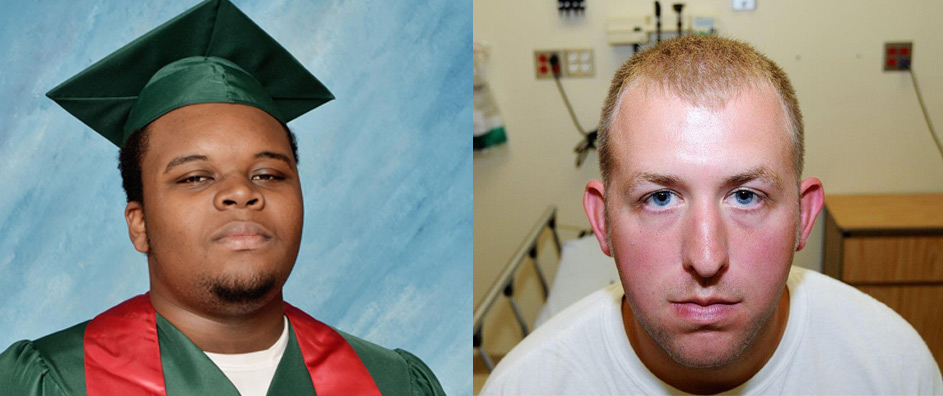The tragic event surrounding the death of Michael Brown in Ferguson, Missouri, serves as a poignant reminder of the complex intersections between race, justice, and societal perceptions. The Bahá’í teachings provide a unique lens through which to examine such contentious realities. This discourse will explore the contrasting narratives stemming from the experiences of Michael Brown and the police officer Darren Wilson, while considering the broader implications of these teachings on social transformation and unity.
At the heart of the Bahá’í Faith lies the principle of the oneness of humanity. This tenet reinforces the notion that regardless of race, nationality, or social class, all individuals share a common identity. The contrasting realities perceived by Brown and Wilson exemplify the pervasive divisions within society. The call for unity, a core Bahá’í principle, invites us to scrutinize the fabric of societal discord while fostering compassion and understanding in our responses to these disparities.
The narrative of Michael Brown represents a significant focal point for discussions on racial injustice and police violence in contemporary America. Brown’s fatal encounter with law enforcement ignited a national conversation about systemic racism and its manifestations. From the perspective of the Bahá’í teachings, this incident showcases profound violations of justice and equity—principles that the Faith holds as sacred. The questions that arise from Brown’s reality highlight the essential need for a dialogue steeped in fairness and the recognition of the dignity inherent in every individual.
Conversely, Darren Wilson’s narrative, that of the law enforcement officer involved, embodies the complexities surrounding policing in a racially charged environment. His experience reminds us of the multiplicity of perspectives that characterize social interactions. While the Bahá’í teachings advocate for the viewing of situations through a lens of justice, it is also incumbent upon followers to understand the pressures and challenges faced by those in positions of authority, thus promoting a holistic view of contentious social dynamics.
Indeed, the dichotomy between Michael Brown’s and Darren Wilson’s realities signifies a broader societal schism: one steeped in historical grievances, the other situated within institutional structures. The Bahá’í context encourages an inquiry into these conflicting narratives with an eye towards reconciliation. Strategies for conflict resolution illuminated by Bahá’í teachings focus on the cultivation of compassionate engagement, which emphasizes dialogue over discord and understanding over hostility.
Moreover, the significance of perception cannot be overstated. The different realities described by Brown and Wilson are, in many respects, shaped by their histories and contexts. In the Bahá’í perspective, empathy lies at the foundation of any effort aimed at resolving injustices. By endeavoring to grasp the entirety of an individual’s experience, we enrich our comprehension of the broader societal issues at play. This counsel mirrors the teachings that urge believers to foster an empathetic community, attentive to the intricacies of human experience.
Additionally, the Bahá’í Faith advocates for social justice as a pathway to the establishment of peace. This social justice paradigm calls for the recognition of the inherent rights of individuals and communities, particularly those marginalized and oppressed. In the case of Ferguson, the outpouring of activism that followed the events surrounding Michael Brown’s death reflects a poignant manifestation of these principles. Activists, often inspired by a sense of duty to uphold justice, lend credence to the Bahá’í tenet that we must actively participate in the betterment of society.
Furthermore, this discourse provides fertile ground for exploring the role of community response in the aftermath of tragedy. The teachings of the Bahá’í Faith emphasize collective responsibility in confronting social evils. This is vividly illustrated in the responses to the Ferguson crisis, where local and national movements galvanized communities to demand change. The Bahá’í community’s engagement in such initiatives reaffirms the importance of unity in affording support to marginalized voices and dismantling institutional barriers that perpetuate injustice.
The role of education emerges as another critical aspect within this context. The Bahá’í teachings highlight education’s transformative power, particularly in fostering understanding and dispelling ignorance. Through education, the narratives surrounding incidents like that of Ferguson can be deconstructed and analyzed, leading to a more profound comprehension of both systemic inequities and individual experiences. A well-informed public is essential in advocating for systemic reforms that address the root causes of societal discord.
Moreover, the need for constructive dialogue is paramount. Encouraging open discussions about race, justice, and community can lead to healing. Engaging both sides—those who feel victimized and those in positions of authority—facilitates an environment conducive to understanding and reconciliation. The Bahá’í teachings underscore this necessity, suggesting that only through sincere dialogue can profound societal change be achieved.
In summary, the narratives of Michael Brown and Darren Wilson serve as a microcosm of the larger societal challenges we face. Through the prism of Bahá’í teachings, the call to unity, justice, and proactive engagement becomes clear. Analyzing these contrasting realities offers an opportunity to reflect on the importance of compassion, understanding, and collective action. As communities navigate the complexities of race and justice, the principles elucidated within the Bahá’í Faith can provide valuable guidance in striving for a more equitable and harmonious society.
